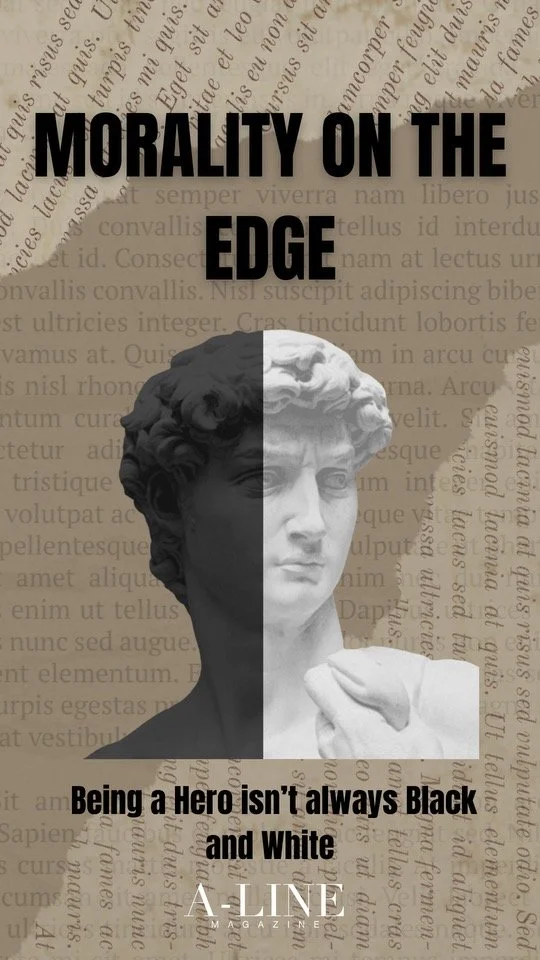Morality on the Edge
Heroes are good and virtuous, representing all that is right, and doing no wrong. They draw a bright red line between good and bad that they will never cross. These heroes, however, are not real. Real humans are so much more nuanced than these one-dimensional figures. Humans walk a gray road, stumbling from one side to the other, just trying to stay moving forward.
It is this complexity, this journey through moral ambiguity, that makes anti-heroes so compelling. They inhabit the space where traditional notions of right and wrong no longer hold sway. Unlike stereotypical heroes, anti-heroes are deeply flawed, often acting out of self-interest or making morally questionable decisions. Yet, they are not fully evil, nor are they completely good. This tension between their actions and motivations creates a compelling narrative that challenges society’s perception of heroism and reflects the gray reality of human nature.
Anti-heroes resonate because they feel closer to the messy, imperfect realities of life. Their struggles with ethical dilemmas, personal flaws, and conflicting values make them relatable in ways traditional heroes are not. They defy simplistic categorization and offer a more honest portrayal of humanity – shaped by internal conflicts, competing desires, and the circumstances of their lives. Anti-heroes serve as a reminder that people are a blend of good and bad, shaped by choices and experiences, reflecting the complexity of morality in real life.
The rise of the anti-hero also reflects a growing disillusionment with authority. In a time when trust in institutions, governments, and traditional structures of power has waned, audiences are increasingly drawn to characters who challenge these systems. Anti-heroes often operate outside the law, acting as vigilantes or rebels, confronting corrupt institutions, and fighting against systems that seem inherently unjust. Walter White from Breaking Bad, for example, challenges the conventional moral order as he begins operating outside the law, driven by personal motives and the belief that the system has failed him. His transformation into a drug lord highlights his disillusionment with societal structures and power systems. What makes Walter White so compelling is that his actions, though morally questionable, are driven by a belief that he is justified in rebelling against a world he feels has wronged him. His transformation into a drug lord becomes a reflection of his internal conflict between his morals and the external expectations placed upon him. By rejecting conventional morality and authority, he embodies the complexities of resistance and justice, offering an alternative to the traditional hero vs villain narrative.
Another factor contributing to the rise of the anti-hero is the increasing emphasis on individualism in contemporary culture. As society becomes more focused on personal freedom, autonomy, and self-expression, the demand for characters who embody these ideals grows. Anti-heroes are individuals who reject societal expectations, following their own moral compasses rather than adhering to external standards of behavior. Tommy Shelby from Peaky Blinders exemplifies this rejection of societal expectations. His actions often transcend moral boundaries, guided by his own code of honor. Despite operating in the criminal world, Shelby’s pursuit of personal freedom resonates with audiences who feel increasingly constrained by societal norms. In many ways, anti-heroes like Shelby represent a response to the pressure of conformity. They provide a form of escapism, allowing audiences to explore the complexities of human ethics without the constraints of traditional expectations. Anti-heroes are free to be imperfect, make mistakes, and challenge the status quo. This freedom allows for a more honest exploration of the human experience while simultaneously dismantling unrealistic standards.
The appeal of anti-heroes also speaks to a broader shift in how ethicality is understood in the modern world. The simplistic dichotomy of good versus evil is no longer sufficient to address the complexities of contemporary life. Issues like systemic inequality, environmental degradation, and global conflict present moral dilemmas that rarely have easy answers. In this context, anti-heroes offer a more nuanced perspective, showing that morality is not always black and white. Characters like Walter White and Tommy Shelby force audiences to confront these gray areas of ethics, pushing them to question traditional assumptions about right and wrong.
Because humans are inherently flawed, the concept of “good” becomes subjective. As society grows more complex, the traditional lines between hero and villain blur, reflecting the imperfection of humanity. Anti-heroes delve into these gray areas, offering a realistic portrayal of human nature by exposing the struggles and mindsets that define real life. Their moral ambiguity resonates deeply, revealing the complexities of justice, choice, and personal responsibility in an imperfect world. By challenging the notion that heroism is synonymous with perfection, anti-heroes invite reflection on the human condition, demonstrating that greatness can be found even in the gray.
Written by Isana Mehta & Social Media: Clara Valkoun

